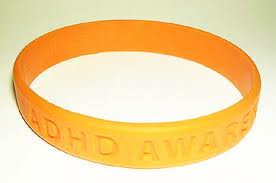International ADHD Awareness
 How many readers actually know what ADHD is, or how it affects the lives of those who have ADHD? Moreover, how it also affects the lives of family members and loved ones? As a certified professional ADHD coach and teacher, having ADHD myself, not to mention having two sons with the same trait, I feel compelled to offer my insight in the interest of adding to awareness about ADHD . I am actually quite happy to have this opportunity to write about ADHD and its legacy, and how some in our society still view ADHD’ers as escapists. In order to achieve a certain quality of life for ADHD’ers, and for them to look to a brighter future, we need to learn to look at them for who they are, so that strong character can shine and put a little spice into our lives. They do not need to keep trying to conform more than necessary and get depressed, because they struggle to operate within the mainstream, be it in school, or at work.
How many readers actually know what ADHD is, or how it affects the lives of those who have ADHD? Moreover, how it also affects the lives of family members and loved ones? As a certified professional ADHD coach and teacher, having ADHD myself, not to mention having two sons with the same trait, I feel compelled to offer my insight in the interest of adding to awareness about ADHD . I am actually quite happy to have this opportunity to write about ADHD and its legacy, and how some in our society still view ADHD’ers as escapists. In order to achieve a certain quality of life for ADHD’ers, and for them to look to a brighter future, we need to learn to look at them for who they are, so that strong character can shine and put a little spice into our lives. They do not need to keep trying to conform more than necessary and get depressed, because they struggle to operate within the mainstream, be it in school, or at work.
It is absolutely imperative, that we focus on the acceptance of different thinking and  working styles. After all, we live in a democratic society where equality is the main agenda. Implementing this attitude in all institutions, and having it exercised in order for ADHD’ers to be appreciated in our society, is a call we all must rise to, in order to eliminate their marginalization. In fact, ADHD’ers can be quite gifted. They are often very illuminative and very creative. ADHD’ers tend to be quite independent and resourceful. They also tend to digest bits of information simultaneously with their own interpretations at hand, thereby creating a very powerful perspective. Scientists have determined that the brain chemistry in ADHD’ers functions differently, or “disorderly” if you will. They have found that ADHD’ers are mainly affected by a deficiency in their executive skills. This feature of the brain, which manifests itself in having difficulties in regulating ones’ inhibition, both in behaviour and emotion, has however, not yet entirely been defined. The question remains, whether or not ADHD is, to some extent, just a “distinction of its own”.
working styles. After all, we live in a democratic society where equality is the main agenda. Implementing this attitude in all institutions, and having it exercised in order for ADHD’ers to be appreciated in our society, is a call we all must rise to, in order to eliminate their marginalization. In fact, ADHD’ers can be quite gifted. They are often very illuminative and very creative. ADHD’ers tend to be quite independent and resourceful. They also tend to digest bits of information simultaneously with their own interpretations at hand, thereby creating a very powerful perspective. Scientists have determined that the brain chemistry in ADHD’ers functions differently, or “disorderly” if you will. They have found that ADHD’ers are mainly affected by a deficiency in their executive skills. This feature of the brain, which manifests itself in having difficulties in regulating ones’ inhibition, both in behaviour and emotion, has however, not yet entirely been defined. The question remains, whether or not ADHD is, to some extent, just a “distinction of its own”.
With regard to students, it is paramount that schools operate with one common ground which The Ministry of Education has laid out as the rule. After all, it is wiser to rely on scientifically proven research about ADHD and the brain, and immediately apply this in order to make an individual educational plan for each student, once the student has been diagnosed with ADHD. Home and school should work holistically with one another. In contrast, randomly relying on individual teachers’ perceptions and lack of understanding about ADHD is jeopardizing the student’s development. They often singlehandedly draw a line as to whether ADHD is confused with stupidity or whether it is just a fake label. In such instances, authorities demand that the child “just work harder” without any deeper understanding of the challenges the student faces, causing the student to burn-out. Of course, for the institutions, there is nothing wrong in using ones’ common sense when addressing the isolated issues, whether or not the ADHD escapist is plainly escaping. Certainly, they often do escape – but mostly, there is a reason why they deny their accountability. Curriculums generally cater for mainstream students and therein lies the challenge for many ADHD students, given a different wiring of their working memory – hands-on activities are crucial to the implementation of teaching, in addition to the purely academic tasks.
 It is unsympathetic of those unaffected by ADHD to judge the parents of ADHD children for being “inadequate” guardians, who they think succumb to labelling their own child in order to escape their own responsibilities. Adults and parents with ADHD have to endure that constant mistrust from the ones from whom they need help the most, be it at school or at work, where they often are rejected because the ADHD’er does not fit the one-size mentality. We have to be alert for potential setbacks, and seek the best possible solutions for ourselves. It can be daunting when those we are dealing with perceive ADHD’ers as incompetent and unreliable because ADHD is perceived to be a “disease”, which is really disheartening. All the while, it is now being revealed as a pure trait on its own with just “deficiency” within the executive skills.
It is unsympathetic of those unaffected by ADHD to judge the parents of ADHD children for being “inadequate” guardians, who they think succumb to labelling their own child in order to escape their own responsibilities. Adults and parents with ADHD have to endure that constant mistrust from the ones from whom they need help the most, be it at school or at work, where they often are rejected because the ADHD’er does not fit the one-size mentality. We have to be alert for potential setbacks, and seek the best possible solutions for ourselves. It can be daunting when those we are dealing with perceive ADHD’ers as incompetent and unreliable because ADHD is perceived to be a “disease”, which is really disheartening. All the while, it is now being revealed as a pure trait on its own with just “deficiency” within the executive skills.
There are many misconceptions about ADHD and medication. As one psychiatrist put it, “Taking the right medication to offset the effects of ADHD is no different than putting on glasses because you have poor eyesight”. ADHD’s impairment to navigating through the practicalities, just happens to be delegated from the inside the brain.
It is absolutely imperative that people in general stop viewing ADHD as a new trendy disorder. In fact, it has always existed, just with another term. That is why, it is a shame that the labour market still doubts an ADHD’ers ethical code and his competence, for that matter, because he or she sometimes fails to address multiple chores in a sequential manner. These habits are often due to the ADHD’ers inadequate auditory processing ability, and the poor retention of information within his challenged short term memory. The ADHD’ers “will” naturally and automatically seek to get the main point first, and then quickly digest it in vivid pictures in the mind, and then address it accordingly and spontaneously. Hence people would often say that he is a person with the mind of his own. And others would perceive him for being the recklessly impulsive person, or again an “oppositional defiant” individual, especially when it comes from a school-aged child.
Last year, the brain scientists of the leading international research centre, Narsad, had their breakthrough. They found a gene variant in ADHD’ers. At the circuits of our neurons, and where chemicals are delegating their jobs, it has turned out that the dopamine behaves differently from non-ADHD’ers. The ADHD person’s taking on the production of the dopamine transporters had appeared to run “backward” in the circuits. Dopamine’s role in the brain circuits is linked to “attention, motor function, and rewarding”. These are called the “executive skills” and have nothing to do with inadequate “thinking”, or inadequate “willpower”. This “backward” running of the dopamine transporter has led some doctors to believe that the ADHD brain has a pure character of its own.
The ADHD brain is just not geared to function in a “sequential manner” as they “should” in our society, but rather in an “all at once fashion” like in the jungle, where for Homo Sapiens, time and planning did not exist. Many perceive ADHD’ers as absorbing slowly; all the while they conjecturally would arrive to the point before the person talking has stopped explaining. This is the reason ADHD’ers would often blurt out, or interrupt the talker accidently. Sure, he should learn not to interrupt. Look, we have all shed our Homo Sapient hair, so don’t you think there is a possibility that ADHD will learn to “wait” and you non ADHD’ers will learn to “give way” to Mother Earth’s nature and creation? So, please see us for who we are, and help us to get the right tools in the schools as well as in the labour market in order for us to shine in our own light.
Thank you!
Kirstine Berthelsen
